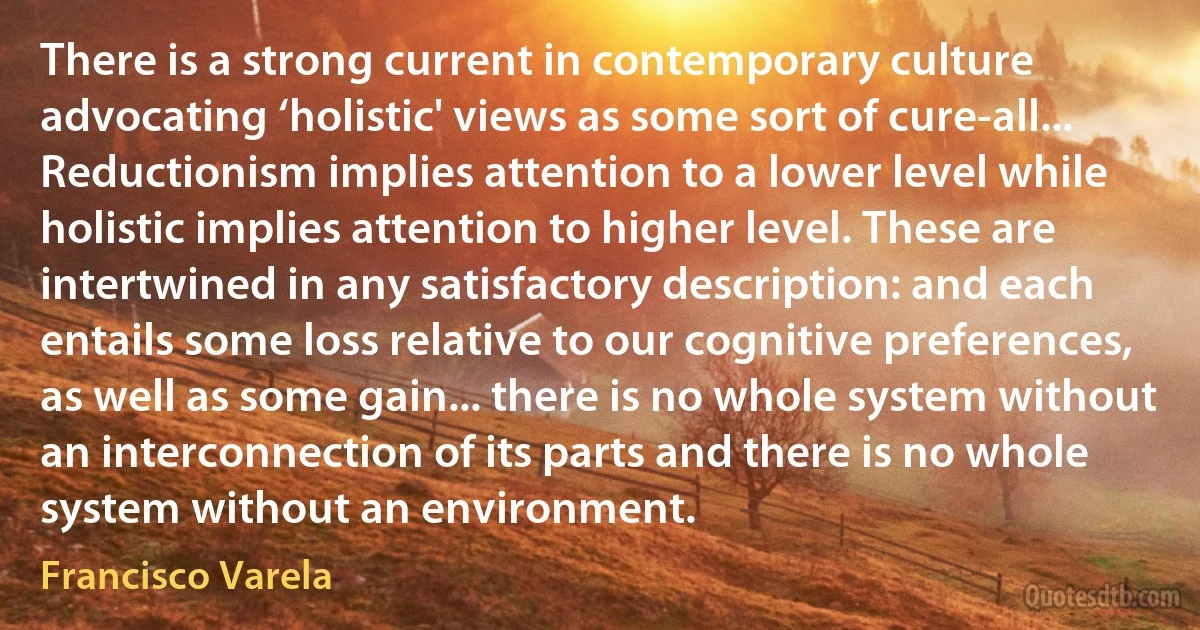Reductionism Quotes
[A] skyhook is ... an exception to the principle that all design, and apparent design, is ultimately the result of mindless, motiveless mechanicity. A crane, in contrast, is a subprocess or special feature of a design process that can be demonstrated to permit the local speeding up of the basic, slow process of natural selection, and that can be demonstrated to be itself the predictable (or retroactively explicable) product of the basic process. ... [T]he physicist Steven Weinberg, in Dreams of a Final Theory (1992) ... distinguishes between uncompromising reductionism (a bad thing) and compromising reductionism (which he ringingly endorses). Here is my own version. We must distinguish reductionism, which is in general a good thing, from greedy reductionism, which is not. The difference, in the context of Darwin's theory, is simple: greedy reductionists think that everything can be explained without cranes; good reductionists think that everything can be explained without skyhooks.

Daniel Dennett
From what can "ought" be derived. The most compelling answer is this: ethics must be somehow based on an appreciation of human nature - on a sense of what a human being is or might be, and on what a human being might want to have or want to be. If that is naturalism, then naturalism is no fallacy. No one could seriously deny that ethics is responsive to such facts about human nature. We may just disagree about where to look for the most compelling facts about human nature -n novels, in religious texts, in psychological experiments, in biological or anthropological investigations. The fallacy is not naturalism but, rather, any simple-minded attempt to rush from facts to values. In other words, the fallacy is greedy reductionism of values to facts, rather than reductionism considered more circumspectly, as the attempt to unify our world-view so that out ethical principles don't clash irrationally with the way the world is.

Daniel Dennett
Gödel's theorem shows conclusively that in pure mathematics reductionism does not work. To decide whether a mathematical statement is true, it is not sufficient to reduce the statement to marks on paper and to study the behavior of the marks. Except in trivial cases, you can decide the truth of a statement only by studying its meaning and its context in the larger world of mathematical ideas.

Freeman Dyson
Modern empiricism has been conditioned in large part by two dogmas. One is a belief in some fundamental cleavage between truths which are analytic, or grounded in meanings independently of matters of fact, and truths which are synthetic, or grounded in fact. The other dogma is reductionism: the belief that each meaningful statement is equivalent to some logical construct upon terms which refer to immediate experience. Both dogmas, I shall argue, are ill-founded. One effect of abandoning them is, as we shall see, a blurring of the supposed boundary between speculative metaphysics and natural science. Another effect is a shift toward pragmatism.

Willard van Orman Quine
I believe that there is a necessary connection in both directions between the physical and the mental, but that it cannot be discovered a priori. Opinion is strongly divided on the credibility of some kind of functionalist reductionism, and I won't go through my reasons for being on the antireductionist side of that debate. Despite significant attempts by a number of philosophers to describe the functional manifestations of conscious mental states, I continue to believe that no purely functionalist characterization of a system entails - simply in virtue of our mental concepts - that the system is conscious.

Thomas Nagel
I maintain that the human mystery is incredibly demeaned by scientific reductionism, with its claim in promissory materialism to account eventually for all of the spiritual world in terms of patterns of neuronal activity. This belief must be classed as a superstition. ... We have to recognize that we are spiritual beings with souls existing in a spiritual world as well as material beings with bodies and brains existing in a material world.

John Carew Eccles
Science gets most of its information by the process of reductionism, exploring the details, then the details of the details, until all the smallest bits of the structure, or the smallest parts of the mechanism, are laid out for counting and scrutiny. Only when this is done can the investigation be extended to encompass the whole organism or the entire system. So we say.
Sometimes it seems that we take a loss, working this way.

Lewis Thomas
Someone with a fresh mind, one not conditioned by upbringing and environment, would doubtless look at science and the powerful reductionism that it inspires as overwhelmingly the better mode of understanding the world, and would doubtless scorn religion as sentimental wishful thinking. Would not that same uncluttered mind also see the attempts to reconcile science and religion by disparaging the reduction of the complex to the simple as attempts guided by muddle-headed sentiment and intellectually dishonest emotion?

Peter Atkins
Holism [is] the art - in contrast with reductionism - of seeing a complex system as a whole. Holism knows the limits to its understanding; it acknowledges that the system has its wildness, its privacy, its own reasons, its defences against invasive explanation ... It does not pretend to understand the whole school just on the evidence of dissecting the geography teacher.

David Fleming
Simple rules can have complex consequences. This simple rule has such a wealth of implications that it is worth examining in detail. It is the far from self-evident guiding principle of reductionism and of most modern investigations into cosmic complexity. Reductionism will not be truly successful until physicists and cosmologists demonstrate that the large-scale phenomena of the world arise from fundamental physics alone. This lofty goal is still out of reach. There is uncertainty not only in how physics generates the structures of our world but also in what the truly fundamental rules of physics are.

William Poundstone


